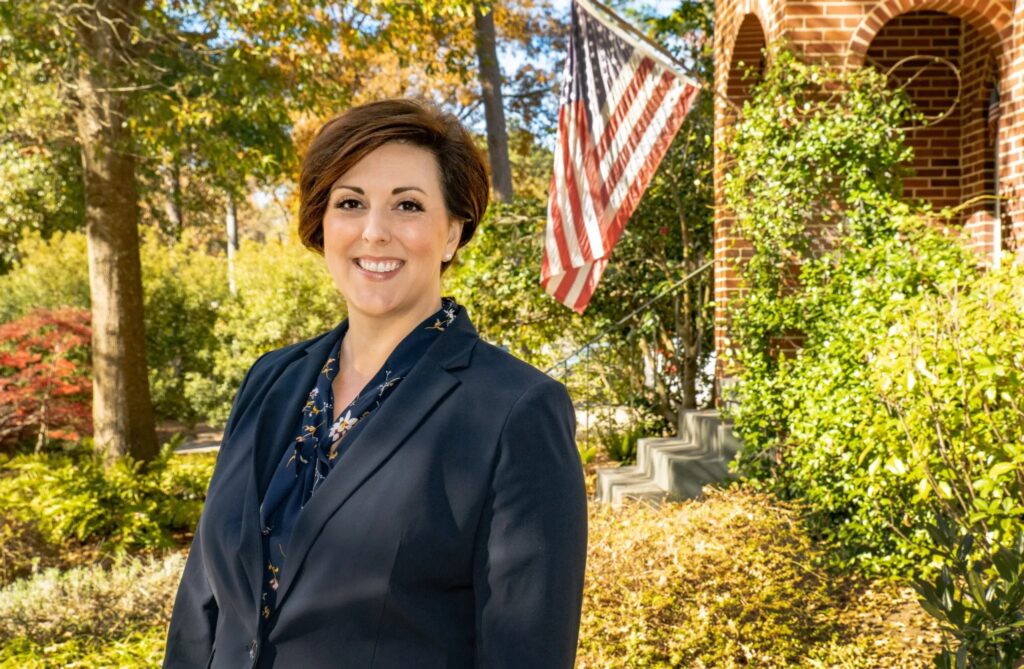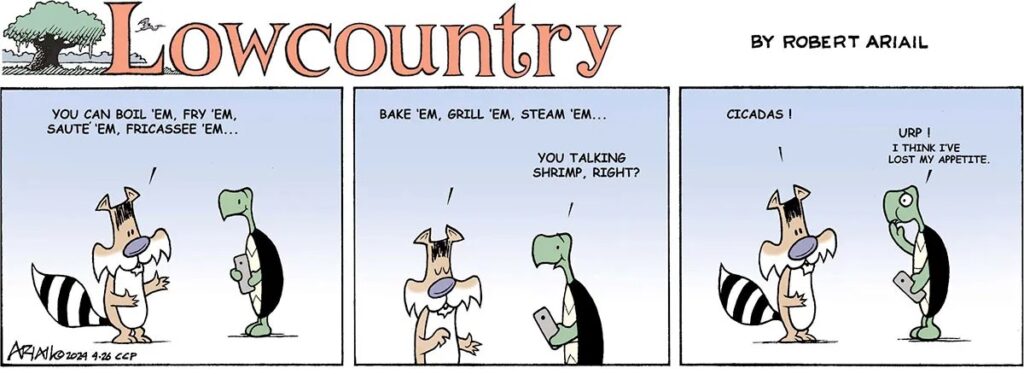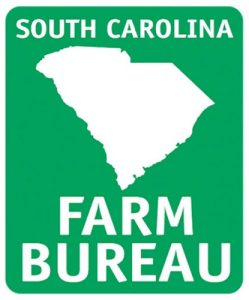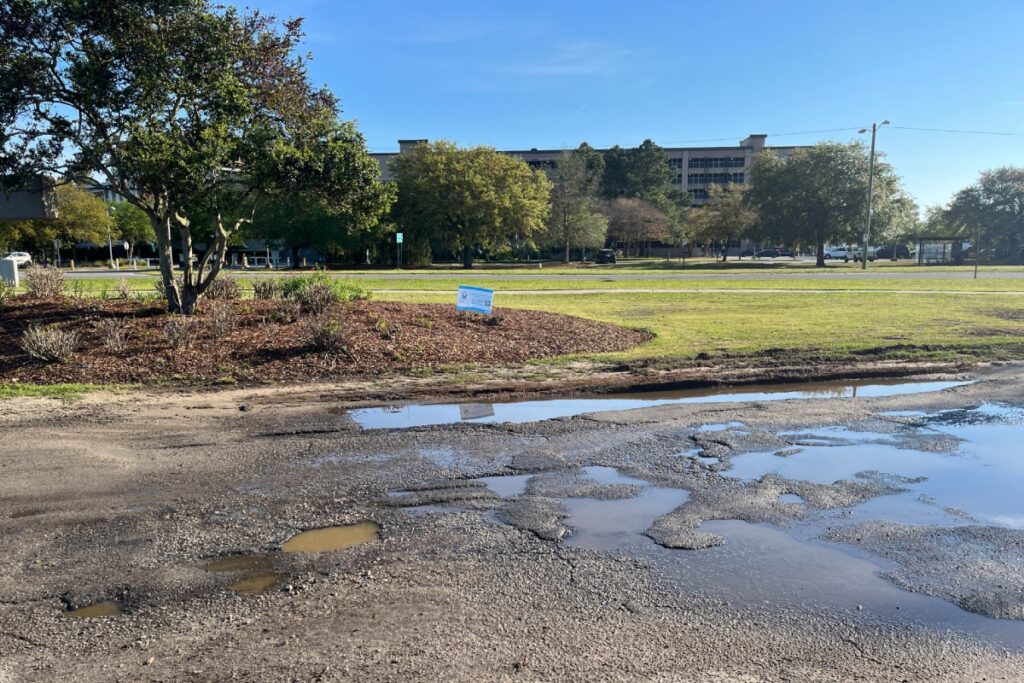STATEHOUSE REPORT | ISSUE 23.17 | April 26, 2024
BIG STORY: Clock ticks down for these 10 top bills
MORE NEWS: Ignore new federal LGBTQ rules, Weaver says
LOWCOUNTRY, Ariail: The “Bubba” treatment for cicadas
COMMENTARY, Brack: Perform intentional acts of kindness
SPOTLIGHT: S.C. Farm Bureau
MYSTERY PHOTO: Take two on this mystery
FEEDBACK: Send us your thoughts
Clock ticks down for these 10 top bills

By Jack O’Toole, Statehouse bureau | With just two weeks left in this year’s legislative session, state lawmakers are under increasing pressure to get some bills passed that have almost made it over the finish line.
After May 9, when the session technically ends, legislators will return only to consider items outlined in a special “sine die” resolution. Bills that have not passed both chambers and been assigned to conference committees are not eligible under sine die rules.
Here are 10 of the most consequential pieces of legislation still under consideration as the deadline approaches.
2024-25 State budget (H. 5100): In March, the S.C. House passed a “lean” $13.2 billion 2024-25 budget plan that reduced overall spending, while raising teacher and state employee pay. It also proposed returning $500 million in sales taxes to homeowners as a one-time property tax rebate. This week, senators took their turn, producing a $13.8 billion budget that would redirect most of the sales tax overage to infrastructure. It also proposes cuts to income taxes by $100 million and fully funds a new medical college campus at the University of South Carolina ($100 million) and a veterinary school at Clemson. ($175 million). Status: Expected to head soon to a conference committee for House and Senate members to develop a compromise. If they don’t finish their work, they may finish in a specially-called sine die session.
Energy (H.5118): An omnibus energy bill, controversial from the start, aims to ramp up power production by overhauling the state’s regulatory system, encouraging next-generation nuclear plants and fast-tracking large-scale natural gas projects like a proposed 2,000-megawatt facility at Canadys. Supporters, including House Speaker Murrell Smith, R-Sumter, say it’s necessary to avert a looming energy crisis. But opponents, such as Senate Majority Leader Shane Massey, R-Edgefield, say it’s a risky plan that needs more study, particularly in light of the state’s calamitous experience with 2007’s Base Load Review Act and the $9 billion nuclear plant fiasco it later caused. Status: Passed House; currently on the Senate floor.
Gender care for minors (H. 4624): Dubbed the “Help Not Harm Act,” the legislation would ban medically-assisted gender treatments, including the use of puberty blockers, for South Carolinians under the age of 18, and deny Medicaid coverage of such treatments for those under 26. Supporters cite recent international medical reviews that question the scientific basis for minor transitions to justify the ban. Opponents say that American medical authorities continue to recommend gender care for minors, and note that the international reviews do not call for a ban on all youth gender treatments. Status: Passed House; reported out favorably by the Senate Medical Affairs Committee; awaiting action on the Senate floor.
Health services consolidation (S. 915): As the state Department of Health and Environmental Control prepares to split into two new agencies on July 1, legislators are already taking a new restructuring step with a bill to merge the state’s six health agencies into one office of health and policy reporting to the governor. The proposal follows a January interim report by the Boston Consulting Group which found that South Carolina’s fragmented health care bureaucracy costs too much and delivers too little. Status: Passed Senate; currently in the House Judiciary Committee.
Hate crimes (H. 3014): With Arkansas’ passage of a “stripped down” hate crimes law in 2021, South Carolina and Wyoming became the only states in the nation without such a law on the books. A proposal named for the late pastor and state Sen. Clementa C. Pinckney, who was one of nine people murdered by racist gunman Dylann Roof at Emanuel AME Church in Charleston in 2015, would add enhanced penalties to crimes motivated by race, color, religion, sex, gender, national origin, sexual orientation, or physical or mental disability. A similar bill died without action in the state Senate in 2021. Status: Passed House; reported favorably by the Senate Judiciary Committee; awaiting action on the Senate floor.
Diversity, Equity and Inclusion (H. 4289): Less far-reaching than earlier legislation that sought to eliminate university DEI programs, the bill would outlaw the use of so-called “diversity statements” in hiring, admissions and promotions at state schools, and require them to submit annual reports detailing the costs and activities of their DEI programs. Status: Passed House; currently in the Senate Education Committee.
Judicial selection reform (S. 1046): Long plagued by charges of poor vetting and cronyism, the state’s judicial selection process has been a target of reformers for years. The current bill aims to improve the system by giving the governor four appointments to the Judicial Merit Selection Commission, which screens candidates for judgeships before they are voted on by the state legislature. It would also limit commission members to serving non-consecutive four year terms. South Carolina is currently one of only two states in which the legislature has complete authority over the judicial appointment process. Status: Passed Senate; currently in the House Judiciary Committee.
Age verification for internet pornography (H. 3424): Following in the legislative footsteps of states like Louisiana and North Carolina, the bill would require pornographic websites to verify that users are 18 or older before granting them access to graphic materials. Proponents say the legislation is needed to protect children from inappropriate content. Critics say it’s a violation of the First Amendment. Status: Passed House, favorably reported by the Senate Commerce and Industry Committee, awaiting action in the full Senate.
Unemployment insurance (H. 4710): Never generous by national standards, Palmetto State unemployment assistance would be further reduced by this legislation, which ties benefits to the state’s unemployment rate. Supporters say the change would increase the size of the workforce. Critics say unemployed workers in rural areas with higher-than-average jobless rates would be particularly hard hit. Status: Passed House; currently in Senate Labor, Commerce and Industry Committee.
Medical marijuana (S. 423): Also known as the Compassionate Care Act, the bill would legalize the medical use of pharmacist-dispensed, non-smokable marijuana products by patients who have been diagnosed with certain specific ailments, including cancer, sickle cell anemia and severe neurological disorders. A previous version of the bill failed two years ago in the House. Status: Passed Senate; awaiting a hearing in the House Medical, Military, Public and Municipal Affairs Committee.
- Have a comment? Send to: feedback@statehousereport.com.
Ignore new federal rules to protect LGBTQ students, Weaver says

Staff reports | S.C. Superintendent of Education Ellen Weaver is recommending that state school districts disregard new federal rules that would expand the definition of sex discrimination under Title IX to protect gay, lesbian and transgender (LGBTQ) students.
Casting herself as a defender of S.C. schools from “divisive distractions from Washinngton,” Weaver wrote in a memo that she expects the rules to be swiftly challenged in the courts before they take effect Aug. 1.
“South Carolina students are not pawns to be sacrificed in cynical political gambits,” Weaver wrote. “Accordingly, our state will defend the inherent dignity of every person, while refusing to upend long-standing federal law, violate common sense, or acquiesce to radical attempts to redefine biological reality by bureaucratic diktat.”
The new rules would mean schools could not treat students differently than their peers based on sexual orientation or gender identity. This could, for example, upend school policies that require transgender students to use the bathroom that conforms to their sex determined at birth.
Advocates for the LGBTQ community in South Carolina slammed Weaver’s memo, arguing that the superintendent is endorsing discrimination.
“Once again, Superintendent Weaver puts her political perspectives ahead of the kids she is supposed to serve,” said ACLU of South Carolina Executive Director Jace Woodrum. “In addition to encouraging districts to ignore federal regulations — and putting our underfunded schools at risk of losing critically needed dollars — her letter suggests transgender kids don’t exist and shouldn’t be protected from discrimination. This rhetoric is yet another example of her callous approach to serving our students.”
The ACLU also points to other efforts from Weaver and S.C. GOP lawmakers that they say would do more harm than good for LGBTQ students, including a push for an “overly broad” book-banning policy (Regulation R. 43-170) that would empower anti-LGBTQ+ groups to purge books from our schools and a classroom censorship bill (H. 3728) that would restrict the ability of teachers to discuss gender inequality in a classroom setting.
In other re![]() cent headlines:
cent headlines:
S.C. senators approve K-12 bathroom mandate. Students in South Carolina’s K-12 schools would need to use bathrooms and locker rooms corresponding to their biological sex at birth under a rule senators inserted into their state budget package.
S.C. House pushes to restart stalled power plant legislation. S.C. House leadership attached controversial energy legislation to a series of innocuous bills in an attempt to pressure senators to take it up.
S.C. House to take up proposed rules on book challenges in state schools. A regulation approved in February by the S.C. Board of Education advanced to the S.C. House floor Tuesday.
S.C. law aims to preserve dwindling farmland. Gov. Henry McMaster ceremoniously signed into law at Cottle Strawberry Farm a new fund to buy the development rights for agricultural lands, making it easier for families to keep their farms and preserve them from development.
Millions in S.C. summer grocery aid will expire in May. South Carolina families have just several weeks to claim millions of dollars in grocery assistance before the aid expires May 14.
S.C. looking at even stricter unemployment benefits. In February, a Republican majority in the S.C. House of Representatives advanced legislation that would index the maximum unemployment benefit payout to the statewide unemployment rate. The Senate has questions in a state that already has some of the nation’s strictest unemployment benefits.
The “Bubba” treatment for cicadas

Nationally award-winning cartoonist Robert Ariail always has an interesting take. This week, he gives the “Bubba” shrimp treatment from Forrest Gump to cicadas. Interesting, but kind of yucky. Love the cartoon? Hate it? What do you think: feedback@statehousereport.com.
Remember to perform intentional acts of kindness

By Andy Brack | It’s been an extremely hectic week so we’re reaching into the opinion vault to recall some lessons offered four years ago when the coronavirus pandemic caused a lot of misery. Remember? Kids were stuck at home with online school. Parents missed work that put food on the table. Some companies closed. And it didn’t take long to find there was nothing much left to watch on TV.
 But amidst the gloom were bright spots of kindness. Neighbors you might not have spoken with in months said hello. You let someone go ahead of you in line at the grocery store. Manners seemed to be back everywhere except in Washington, D.C.
But amidst the gloom were bright spots of kindness. Neighbors you might not have spoken with in months said hello. You let someone go ahead of you in line at the grocery store. Manners seemed to be back everywhere except in Washington, D.C.
“I’m hearing people are making it and not complaining,” noted cookbook author Nathalie Dupree said in April 2020. “Everyone is being very kind to us, bringing us food, making deliveries.”
The Rev. Kylon Middleton, senior pastor at Mount Zion AME Church in Charleston who now serves on Charleston County Council, discovered similar graciousness.
“I am noticing that people are kinder and more intentional,” he said. “As I walk in my neighborhood, either early morning or later in the day, I encounter folks who are being more intentional about speaking and acknowledging the presence of others.
“Even from afar, I see the warmth and hope in the eyes of those with whom I meet. I see a resiliency of spirit that continues to persevere amidst the uncertainty of our times. I see generosity and consideration in something as subtle as negotiating space on a sidewalk or being mindful at the grocery store to only buy what’s needed so that someone else and their family can have access to basic items.”
Former Sumter Mayor Joe McElveen noted back then that he thought the virus challenged everyone to be better.
“For instance, I may be a hardliner who thinks that ‘stay at home’ is for pansies and that I will not die from COVID-19; but I also have a mother, sister, wife or daughter whom I do no not wish to kill or even infect,” he observed. “Do I really enjoy sitting with 70,000 people at a sporting event; or am I kind of liking time around the house with my family? Lots of things we held as indispensable are turning out not to be so important after all.”
State Rep. Chandra Dillard, D-Greenville, said the pandemic caused South Carolinians to be more purposeful about their time with family members.
“My Facebook is full of examples of parents dancing with their kids (and) sharing generational music and simply talking,” she said four years ago. “Communities have become innovative and collaborative about how to serve our most vulnerable populations. This has gotten organizations out of their silos and combining resources.”
Perhaps what was most interesting was how all of this kindness seemed to be organically contagious — that people were doing it on their own, despite spats about politics and nonsense from state and national leaders.
The Charleston City Paper, for example, highlighted nine stories of kindness that included a Mount Pleasant mom and daughter who posted a Joke a Day in their Snee Farm yard, only to be reprimanded by a grumpy homeowners’ association for breaking a sign rule. Charleston police partnered with the city’s parks department to offer safe pop-up Easter egg giveaways for kids. A photographer made fun chalk drawings for backgrounds for neighborhood photos.
These examples were exactly how people across our state and nation should have responded. And four years later, a big lesson from the pandemic: Continue to perform intentional acts of kindness. You’ll be glad you did, as Winston Churchill once alluded to: “We make a living by what we get, but we make a life by what we give.”
Andy Brack is editor and publisher of Statehouse Report and the Charleston City Paper. Have a comment? Send to: feedback@statehousereport.com.
S.C. Farm Bureau
 Statehouse Report is provided for free to thousands of subscribers thanks to the generosity of our underwriters. Today we shine a spotlight on our newest underwriter, S.C. Farm Bureau. It is a grassroots, non-profit organization that celebrates and supports family farmers, locally-grown food and rural lands through legislative advocacy, education and community outreach.
Statehouse Report is provided for free to thousands of subscribers thanks to the generosity of our underwriters. Today we shine a spotlight on our newest underwriter, S.C. Farm Bureau. It is a grassroots, non-profit organization that celebrates and supports family farmers, locally-grown food and rural lands through legislative advocacy, education and community outreach.
S.C. Farm Bureau’s alliance of nearly 100,000 members includes everyone from foodies and fishermen to lawyers, restaurateurs, entrepreneurs, community leaders, and of course, farmers. By connecting farmers to the larger community, the organization cultivates understanding about agriculture’s importance to our local economies. The S.C. Farm Bureau explains its mission: “We deepen our collective knowledge of who, where and how food grows. We empower people to make informed choices. We grow mutually-beneficial relationships. And, we ensure the future of the family farms, locally-grown food and the rural South Carolina lands we love.”
- To learn more about S.C. Farm Bureau’s programs, click here.
- To view media and publications, click here
- For policy and legislation, click here.
Take two on mystery

We had terrible problems with email over the last week, so we’re going to give last week’s mystery a second chance. If you sent an answer last week, please resend because it could have ended up in email purgatory somewhere.
Hint: The photo was taken in Charleston County. Where was this photo taken? Send your name, hometown and guess to: feedback@statehousereport.com.
- Send us a mystery picture. If you have a photo that you believe will stump readers, send it along (but make sure to tell us what it is because it may stump us too!) Send to: feedback@statehousereport.com and mark it as a photo submission. Thanks.
Send us your thoughts
We encourage you to send in your thoughts about policy and politics impacting South Carolina. We’ve gotten some letters in the last few weeks – some positive, others nasty. We print non-defamatory comments, but unless you provide your contact information – name and hometown, plus a phone number used only by us for verification – we can’t publish your thoughts.
- Have a comment? Send your letters or comments to: feedback@statehousereport.com. Make sure to provide your contact details (name, hometown and phone number for verification. Letters are limited to 150 words.
- ORDER NOW: Copies are in Lowcountry-area bookstores now, but if you can’t swing by, you can order a copy online today.
- Now available as an e-book!
ABOUT STATEHOUSE REPORT
Statehouse Report, founded in 2001 as a weekly legislative forecast that informs readers about what is going to happen in South Carolina politics and policy, is provided to you at no charge every Friday.
- Editor and publisher: Andy Brack, 843.670.3996
- Statehouse bureau chief: Jack O’Toole
Donate today
We’re proud to offer Statehouse Report for free. For more than a dozen years, we’ve been the go-to place for insightful independent policy and political news and views in the Palmetto State. And we love it as much as you do.
But now, we can use your help. If you’ve been thinking of contributing to Statehouse Report over the years, now would be a great time to contribute as we deal with the crisis. In advance, thank you.
Buy the book
Now you can get a copy of editor and publisher Andy Brack’s We Can Do Better, South Carolina! ($14.99) as a paperback or as a Kindle book ($7.99). . The book of essays offers incisive commentaries by editor and publisher Andy Brack on the American South, the common good, vexing problems for the Palmetto State and interesting South Carolina leaders.
More
- Mailing address: Send inquiries by mail to: P.O. Box 21942, Charleston, SC 29413
- Subscriptions are free: Click to subscribe.
- We hope you’ll keep receiving the great news and information from Statehouse Report, but if you need to unsubscribe, go to the bottom of the weekly email issue and follow the instructions.
- Read our sister publication: Charleston City Paper (every Friday in print; Every day online)
- © 2024, Statehouse Report, a publication of City Paper Publishing, LLC. All rights reserved.


